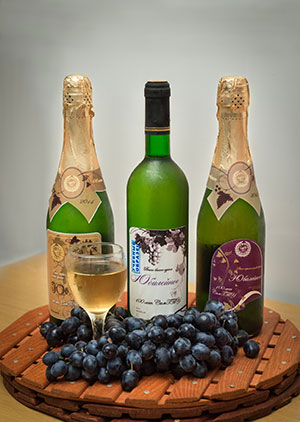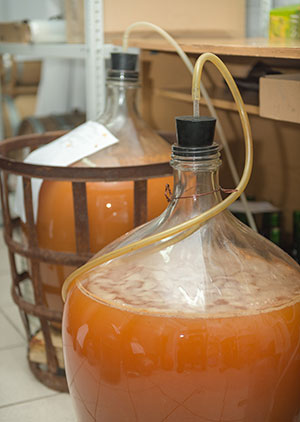Samara Polytech scientists developed a unique recipe for wine made from Samara region grapes
New technologies for high-quality production from local raw materials are created at the Food Production Faculty of the Flagship University

Samara region is not included in the list of wine-growing regions of Russia, however, winemaking starts to develop in Samara region thanks to Samara Polytechnic scientists. Foreign experts and connoisseurs of quality wines highly appreciated this drink.
The founder of the legendary Spanish winery, senor Torres, taught his children: «The best wine is made at home.» If scientists get down to business, they are able to make a scientific discovery. So, scientists of Food Production Faculty of Samara State Technical University have made a real breakthrough in the field of winemaking.
Students at the laboratory of Food Production Faculty analyzed four varieties of local grapes: «Crystal», «Citronny Magarach» (exported from Crimea and sorted in Samara conditions), «Platovsky» and «Levokumsky» and made a map reflecting the dynamics of different varieties’ indicators. There are good conditions for growing grapes and winemaking in Samara region. Region-grown grapes gain up to 20-21 per cent of dry matters which is fairly enough for making quality dry wines. On the other hand, grape variety called «Isabella» found almost on every farm around the region can’t be used for wine-making, as experts say it contains a lot of methanol which is poisonous.
Although based on traditional methods, wine-making still has some peculiarities. For example, quite often different ferments are added to wine in order to fasten maturation or brighten it and to get as much juice from raw material as possible.
«We never use ferments,» says Vladimir Bakharev, the Dean of the Faculty. «In general, we try to use as few additives as possible. Even sulfitation is carried out in fewer amounts than required. Thus we get a more natural product even though it becomes less stable. I stand for using natural raw materials without any additives. Why spoil good primary product?»
Not long ago Samara Polytech scientists set a goal to produce sparkling wine from local raw materials. As a result, they produced samples of pink and white champagne. According to an excerpt from the protocol of the Tasting Industry Commission «Massandra», our sparkling wine Rose Brut «Jubilee» received a score of 8.6 out of 10, and our dry white wine received a score of 8.25.
Samara Polytech champagne is made using the classic method according to which champagnization is carried out inside the bottle. Sugar and yeast are put into dry wine and it starts to ferment. Bottles are stored in a special refrigerator with a temperature of slightly above zero; they are stored at certain angle so yeast gradually goes down. While opening, the crust is removed and wine becomes a finished product.
In addition to grape wine, Samara Polytech laboratory produces cider and apple brandy. A patent has already been obtained for a new way of producing apple brandy.
The head of the trading house «Christian Drouin», founded in 1960 in Normandy, Christian Drouin, Jr., tasted Polytech's apple brandy and cider and left a positive response. «Christian Drouin» is the «trendsetter» in the production of cider, calvados and other alcoholic beverages based on apple raw materials.
Effectivement j’ai eu la possibilité de goûter ces produits parfaitement élaborés et de qualité indiscutable. Il faudrait à mon sens poursuivre les recherches pour développer une plus grande complexité mais dans leur expression actuelle ils sont très agréables à déguster. Les consommateurs russes aiment l’arôme et le goût des produits à base de pommes et ceux-ci sont susceptibles de trouver un marché en Russie. Bien à vous Christian Drouin *
* Indeed, I had the opportunity to try SSTU products. They are perfectly made and have impeccable quality. In my opinion, it is necessary to continue research in this direction in order to reach a higher level, but even now the drinks are very palatable. Russians love the aroma and taste of apples and products made from them, and these drinks can be widely used in Russia. With best wishes, Christian Drouin. (Translation from French).


https://www.eurekalert.org/pub_releases/2018-07/sps-sps073018.php
